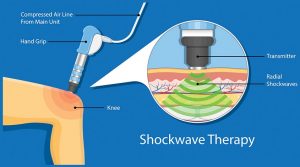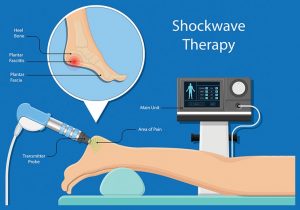Posted on : 13 Jun 2022 | No Comments

If you’ve been struggling with a long-term musculoskeletal problem, we might suggest shockwave therapy. We’ve seen excellent results with this convenient, non-invasive technique that has practically no side effects. Shockwave therapy can help you improve chronic musculoskeletal conditions and speed up recovery. Here at SportMediTec Performance we use the Swiss EMS Guided Dolorcast Shockwave Therapy unit which has been proven to cure 90% of all major indications of the musculoskeletal system.
Shockwave therapy (also known as extracorporeal shockwave therapy or radial shockwave therapy) is a non-invasive treatment method that promotes natural tissue healing for a range of sub-acute to chronic musculoskeletal disorders that are difficult to heal.
A sub-acute disorder is a relatively recent or changing problem. A chronic problem is something you’ve been living with for a long time, usually over 3 months with very little change, for example, Achilles tendinopathy or plantar fasciitis.
You may already have received some kind of treatment but without any improvements. That’s when we propose radial shockwave therapy as a potential solution.
Following this link you can find a video about shockwave.
If you and your therapist agree that shockwave therapy is the best treatment option, your therapist will smooth some gel over the area to be treated then move a hand-held device slowly around that part of your body. The device uses radial pressure waves to transfer a high dose of energy to the pain region, making some clicking sounds as it operates. The transmitted energy stimulates your body’s natural healing response.
One 5-10 minute session may be enough to reduce pain for many patients while others report notable improvement after approximately 3 treatments.
Shockwave therapy awakens your body’s natural healing response, helping to heal injured tissue rather than just manage painful symptoms.
And it’s non-invasive. It helps avoid the need for medication, steroid injections or surgery, which have greater potential side-effects and longer recovery time. With shockwave therapy, you’re able to return to your normal activities as soon as the treatment session is over.

Shockwave Therapy can assist in the treatment of a growing number of conditions including:

After treatment, your body continues its natural healing processes, stimulated by radial shockwave therapy. We usually advise that you refrain from exercising the treated area for about 48 hours.
You’ll be given a personalised program of specific exercises to help your condition. These stretches and exercises help to build your strength and flexibility and reduce the risk of further injury.
You might feel a bit of discomfort, or even a little pain, but this will be quickly over since the treatment only lasts a short time. We can also lessen the intensity of the treatment if you find it too much — please let your therapist know how you’re feeling.
Some patients report a little soreness in the treated area a few hours afterwards but this usually passes quickly and doesn’t limit your activities. Most patients will experience immediate pain relief following the treatment.
Only the very mild ones mentioned above. It’s a remarkably convenient treatment with negligible complication rates. That’s especially significant when compared to invasive treatments such as cortisone injections or surgery, which have greater potential side effects and longer recovery times.
We hope so, but there are no guarantees for any kind of medical treatment.
We have seen wonderful results in many patients who were struggling with painful conditions that weren’t responding to other treatments.
Steroid (glucocorticoid) injections are sometimes recommended for a number of conditions. However, with tendinopathy, the effect of cortisone injections has decreased over the past decade and could impact the tendon tissue in the long term, including cell necrosis (death) (2).
Shockwave Therapy does not have the same negative side effects with tendon tissue.
The number of sessions needed will depend on:
Most patients need between 3 and 5 sessions but everyone is different. The right number of treatments depends on the type, location and persistence of your injury. Your sessions will be 5-7 days apart to provide your body with enough time to make progress between treatments.
The therapy is used on many individuals but isn’t recommended for:
The cost of shockwave therapy is the cost of one of our standard long consultations at SportMediTec plus a surcharge of ($60). As your shockwave therapy is performed by a qualified Doctor of Chiropractic, private health rebates can be used towards the cost of treatment.
No, you do not need a referral but you do require an initial assessment to determine if shockwave therapy is suitable for you.
If you are struggling with an injury or condition that’s been bothering you for a while, talk to Dr Sherry or Mic about whether shockwave therapy could help you.
Leave a Reply
You must be logged in to post a comment.